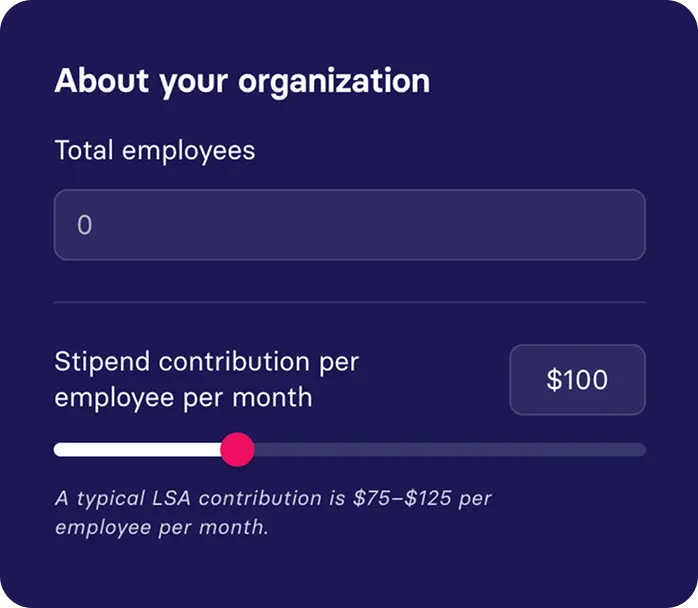In this post
Lorem ipsum dolor sit amet
Lorem ipsum dolor sit amet
Hiring the right benefits broker can make an enormous impact on your organization, the well-being of your employees, and even your company’s financial bottom line. Many organizations fail to realize that hiring the right broker should be like hiring a critical employee. Has the role been defined? Do you have a list of qualifications and questions? Have they been thoroughly interviewed by the team?
The first step is deciding when your organization needs a new (or your first) benefits broker and understanding some of the terms and definitions in the industry.
What is an employee benefits broker?
A benefits broker is a licensed insurance professional who can help your organization create a benefits package for employees. They help you choose benefits offerings that are cost-effective and customized to your company’s unique needs and goals.
Benefits brokers are knowledgeable about available benefits programs, pricing structures, and which vendors to select from. They often have relationships with vendors and can work on your behalf to negotiate plans. Brokers may vary widely in their scope of expertise. Some provide a wide range of services, while others specialize in a certain type of benefit.
What value do benefits brokers add to your business?
Employee benefits brokers can have a huge impact on your organization. Benefits account for about 31% of an employee’s compensation, and the right benefits broker can ensure that you’re maximizing your return on investment. The value of benefits brokers goes beyond the financial, too. They also influence employee engagement, employee morale, and your recruitment efforts. Here are a few advantages of hiring an employee benefits broker:
- Saving your company on employee benefits costs
- Designing a benefits package within your budget
- Ensuring you comply with regulatory requirements
- Educating you on best practices and compliance issues
- Receiving expert advice on options that best suit your organization
- Providing benchmarking information to ensure your benefits are competitive
- Building a case for benefits options and gaining buy-in from leadership
- Connecting you to vendors they have established relationships with
- Reviewing and negotiating contracts with vendors you select
- Communicating with employees so they understand their benefit options
How to choose an employee benefits broker
If you have a current broker and are looking for someone new, it’s best to begin the search as far in advance of your contract renewal as possible. Below are a few steps you can take to ensure you find the best fit.
1. Consider your requirements
Your first step should be determining what you want in an employee benefits broker. It will be hard to evaluate candidates if you have not sat down to consider your non-negotiables and dealbreakers. Knowing what you are looking for in a broker will help you ask the right questions and find the best fit for your company’s needs.
2. Build a list of candidates
After nailing down your requirements, create a list of brokers with the right qualifications and relevant experience. SHRM’s BrokerFinder tool helps organizations sift through licensed brokers who have experience in various regions, industries, and specialties such as compliance or employee communications.
3. Put together an RFP
While not a requirement, you might consider issuing a request for proposal (RFP). This will allow you to receive detailed bids from available benefits brokers so you can thoroughly compare your options. Some questions to cover include:
- Basic company information: What is the firm’s ownership structure? Do they have experience within your geographic market and industry? Do they have proper licensing? Have they worked with companies of your size?
- Fees and commission schedule: What is the broker’s payment structure? Brokers can either be paid commissions by insurance companies, or they can charge a flat fee. Many charge a flat fee based on the number of covered employees per month.
- Compliance knowledge: How will the broker help your company comply with local, state, and federal legislation? They should have tools and resources that ensure compliance with HIPAA, ACA, ERISA, COBRA, and other regulatory requirements.
- Employer services: What specific services does the broker offer as they help you build a benefits package? For example, will they help with areas such as goal setting, strategy and planning, plan design, nondiscrimination testing, vendor negotiations, contract review, financial projections, claims analysis, benchmarking, and reporting?
- Employee services: Many brokers also provide support directly to employees. Does the broker assist employees with open enrollment by providing education and training? Will they send benefits communications to employees and ensure that employees understand their offerings?
- Wellness and perks: To be competitive in today’s market, employers increasingly offer wellness programs and perks such as professional development stipends, food benefits, family and childcare planning, lifestyle spending accounts, WFH setup, or rewards and recognition programs. Does the broker have experience with these types of programs?
4. Interview candidates
After narrowing down your vendors of choice, it’s time to interview candidates. Your choice has a big impact on the success of your benefits programs and overall company goals, so treat the process like you would if were hiring an employee.
- Provide structure: Introduce the broker to who they would primarily be working with at your organization and highlight your company’s values and goals.
- Be prepared with questions: Thoroughly examine the answers provided in the RFP and come prepared with additional questions and concerns.
- Ask for their track record: Ask for examples of success at organizations similar in scope to your own so you get a sense for their process.
- Allow them to ask questions: An interview is a two-way street. The right broker will have just as many questions for you as you have for them.
5. Check references
Don’t forget to ask to speak to a few current clients who are in your industry or have other similarities to your organization. They’ll be able to provide more insights on what value they have gained from that broker and what customer support and service are really like during times of high stress, like open enrollment.
Broker options
There are many available options for companies seeking an employee benefits broker. Below are a few popular brokers to consider.
Mercer
Mercer is a firm providing actuarial and benefits consulting services. Mercer’s dedicated team of 9,000+ benefits experts help companies in 140+ countries manage their benefits through experience in global benefits strategies, governance models, benefits management, coordination, local broking, technology, and health and well-being programs. The firm offers a range of consulting, brokerage, and digital solutions to improve the employee experience, including strategy and planning, design and financing, vendor selection and management, and delivery and communication.
Gallagher
Gallagher is a global insurance brokerage and risk management and consulting firm. The firm has a network of 39,000 expert advisors and partners in more than 130 countries. The Gallagher Voluntary Benefits team assists by companies by conducting benefits gap analyses, analyzing employee engagement strategies and providing recommendations, increasing employee participation with reporting and continuous refinement, and creating effective communication strategies.
Sequoia
Sequoia provides comprehensive services and technology to help small, mid-size, and enterprise businesses create successful total rewards experiences and people investment strategies. Consultants have expertise in HR, benefits, and employee culture. Sequoia is licensed in 50 states and serves 1,700+ clients, with 200+ international clients.
Alliant Insurance Services
Alliant Insurance Services is an insurance brokerage and consulting firm with expertise in a wide range of verticals. The firm provides specialized benefits expertise and consulting services for benefits strategy, health and productivity, voluntary benefits, pharmacy benefits, global workforce consulting, technology consulting, and more. Alliant is also experienced in compliance services, benefits communications, analytics and reporting, and benefits benchmarking.
Lockton
Lockton is a privately owned brokerage firm with 10,000+ associates doing business in over 125 countries. The firm emphasizes their family ownership, independence, entrepreneurial thinking, and creative approach to benefits consulting. Their people solutions include services in employee experience and engagement, total rewards and benefits, and measurement and management.
Brown & Brown
Brown & Brown is an insurance brokerage in the U.S. with 14,500+ teammates in over 450 locations. From large multinational organizations to small businesses, the firm helps companies develop comprehensive benefits programs. They help design programs, manage costs, ensure compliance, identify software solutions, and improve performance. Brown & Brown’s benefit solutions span voluntary benefits, pharmacy benefits, employer stop loss, global benefits, private equity and mergers and acquisitions, and strategic non-medical solutions.
USI Insurance Services
USI is an insurance brokerage and consulting firm with 10,000 associates in nearly 200 offices across the U.S. and more than 150 years of consulting and brokerage experience. USI’s employee benefits services include underwriting and insurance anlytics, HR services, population health management, compliance and healthcare reform, healthcare cost management, pharmacy benefit consulting, and ancillary benefit consulting. The team leverages the USI ONE Advantage platform to analyze clients’ business issues and challenges and provide tailored recommendations for improving employee benefits plans.
Aon
Aon serves clients in over 120 countries by helping them make decisions that create a more flexible and resilient workforce. The firm provides tools for companies to build new reward structures that maximize profit as well as engagement. They advise organizations on solutions such as employee health and well-being programs and retirement.
HUB International
HUB International is a North American insurance brokerage with 16,000+ employees across over 530 offices. Their employee benefits solutions emphasize cost management, personalized benefit options, and a positive employee experience. HUB’s services encompass strategic benefits planning, healthcare cost management, HR technology and benefits administration, compliance, pharmacy benefits management, benefits analytics, benefits communication, health and wellness programs, and employee value propositions.
Learn more
Picking the right benefits broker can make a long-term impact on your organization. There is no question or concern too small to address along the way to ensure that you have found the right fit. If you’re interested in learning more about Benepass, request a demo or contact our team at sales@getbenepass.com.






